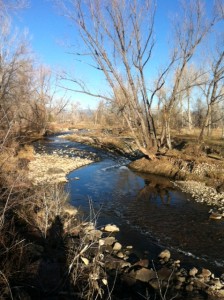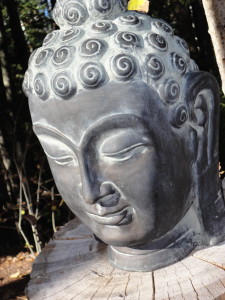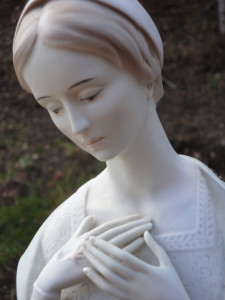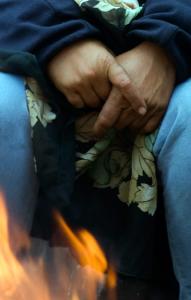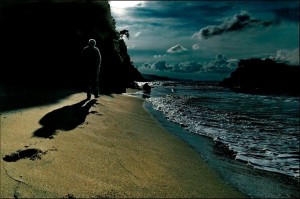Please Login to view this content. (Not a member? Join Today!)
Care of the Dying
Truck Stop Wisdom
I mentioned in a previous post that this week I have been on a working retreat near a wetlands area where I’m getting caught up on lots of computer tasks (like writing blog posts!)
There’s a little truck stop cafe across the street from the modest hotel where I’m staying and I’ve gone there for a few of my meals when I’ve grown tired of the snacks I brought with me. The food there is nothing special but it’s convenient, hearty and satisfying – exactly what a trucker or traveler might hope for in a meal on the road.
Mostly I’ve enjoyed mingling with my fellow diners at this little cafe. I feel comfortable here around these solid, down-to earth, hard-working people who stop in for a small break during their busy day.
I am reminded of spending time at my Dad’s gas station when I was growing up and hanging out with his customers – the “blue-collar” workers who keep things running in our society – the ranchers, repairmen, deliverymen, ditch diggers, drivers, builders, and bricklayers. You won’t see a three-piece suit or a necktie there (though perhaps a clean shirt and a bolo tie if there’s a wedding or a funeral that day.)
As a writer and storyteller I am also an expert eavesdropper (it’s a requirement for this job), which means my hearing is pretty good and I don’t mind listening in on the conversations of life as they roll out all around me. During my two meals at the cafe I couldn’t help but take in a couple of discussions that were happening at nearby tables and I want to share the gist of them here:
The first day a young mother with two small children at a table behind me chatted with a gentleman sitting alone in the next booth. She was in the process of moving to start a new life with her children in a new town – feeling nervous and excited at the same time. He was a traveling salesman who spent most of his days either driving from town-to-town or hoofing it from door-to-door, just hoping to find a willing customer.
“That sounds so hard,” she remarked.
“It is,” he replied, “yes it is hard.” And then he added the line that struck home with the young mom and with me:
“But I learned a long time ago that no matter what happens, you never stop believing in yourself. You just keep going to the next door and the next door and you never doubt that you can do this. And sure enough … somehow … you do. You end up being okay.”
The mom replied, “That’s just what I needed to hear!” as I was thinking the very same thing. I needed that reminder to keep going and believing and showing up every day to be the person I came here to be.
Like every good eavesdropper I recorded that inspiration in my memory banks, so I can pull it out whenever I get discouraged. And then the next day I overheard another even more powerful story that touched my heart:
Two men at a booth behind me were in deep conversation with one another. I couldn’t see them but I assumed they were both truckers because they were sitting in a section marked “Professional Drivers Only” – I smiled to think that in this setting truck drivers are the VIP customers, and rightly so.
One man did most of the talking as he described a horrifying accident that had recently occurred. A young man on a bicycle had become distracted and collided with the passenger-side of his truck. The cyclist skidded on the road and was thrown underneath the truck where he somehow avoided being run over by any of the 18 massive wheels of the machine.
The trucker raced out of the cab of his truck after screeching to a halt in the road and expected to see a mangled body on the pavement. But the young man, covered with road rash, was standing there all in one piece, dazed and confused, while his bike lay in the weeds along the side of the road.
Overwhelmed with relief, the trucker ran up to the cyclist to verify that he was truly alive and well. Next he told his companion at the table that without really thinking about it he had said this to the young man:
“Son, there is no way you should be alive right now. God wants you to be here because you have a purpose. Get your life in order.”
“I don’t know why I said it,” the trucker added, “but it blew that kid away!” I was feeling blown away too that I had been privileged to hear about this event that changed life forever for a truck driver and a young man on a bike – even though I had to “sandbag” on the conversation in order to listen.
Once again I recognized that life connects us all together in its mysterious ways, with unseen threads of suffering and hope and love and grace. While we begin and end our journeys alone, our lives on this path are woven together with all of humanity in an intricate tapestry, like each star in the splendrous sky.
And when we can let go and trust the process of life, we will discover that we are exactly where we need to be, right here and right now.
Stop and listen. You will hear, without a doubt, the harmonious symphony of an infinite number of living beings, each singing their own unique melody. And if you listen close enough, you might discover, too, an occasional blast of a horn or screech of a brake as the wheels keep turnin’ and the freight keeps rollin’ down this highway of life.
And so that’s all for now – “I’m down ‘n gone; eighty-eights around the house; keep ’em between the ditches, jack.”
Dr. Karen Wyatt is a hospice and family physician who writes extensively on spirituality and medicine, especially at the end-of-life. She is the author of the award-winning book “What Really Matters: 7 Lessons for Living from the Stories of the Dying.” Connect with her at karenwyattmd.com, on Facebook at fb.com/karenwyattmd and on Twitter @spiritualmd.
5 Books That Changed My Life
“Books let us into [men’s] souls and lay open to us the secrets of our own. They are the first and last, the most home-felt, the most heart-felt of our enjoyments.”
-William Hazlitt (1778-1830)
This quote from English philosopher and essayist William Hazlitt was written near the end of his life when he was bedridden with a painful illness. In his essay “The Sick Chamber,” where he chronicled his own illness and decline, he wrote, “This is the time for reading,” describing the enrichment he received from the books he was able to read during this pivotal time in his life.
As I look back at my own life it is apparent to me that books and my love of reading have played a profound role in my growth as a person and as a spiritual being. Each time life has presented me with a new challenge or an impetus for spiritual growth, I have found a book (or several) to be my perfect companion on the journey, offering me wisdom and enlightenment along the way.
Now at this moment in history, as we are facing numerous difficulties across the planet, seems to be the perfect “time for reading.” So I’ve compiled a list of five of the books that have especially shaped my own course of development and brought me through some of my own difficult times. If you are looking for life-changing reading material, you may want to start here:
Healing the Shame that Binds You by John Bradshaw
I initially started reading this book because I thought it would be helpful to recommend to my patients, many of whom were dealing with childhood traumas. I had not recognized my own childhood wounds or the depth of shame I was carrying until I immersed myself in its pages and began exploring old memories. From that moment on my healing began.
Minding the Body, Mending the Mind by Joan Borysenko
This book introduced me to the concept of mind-body medicine and gave me a new vocabulary of terms like “relaxation response.” I understood for the first time how the mind influences physical health, which changed the way I practiced medicine. As a result of this new knowledge I started using yoga and meditation in my own life, which produced powerful changes for me over time by reducing my anxiety, helping me focus, improving my balance and quieting my thoughts. These practices were important as I struggled to heal my grief over my father’s suicide death.
Anatomy of the Spirit by Caroline Myss
In this groundbreaking book, Caroline Myss depicts the connection between the spirit and the body-mind and the role of spiritual energy in health and illness. Her linking together of the Chakra system, the tree of life and the 7 sacraments was totally awe-inspiring to me and, once again, I changed not only my medical practice but my own spiritual practice, as well. My view of my patients became fully “wholistic” as I began to see the presence of spirit in each and every life and to understand the role that illness and loss play in our transformation as spiritual beings. This had a profound impact on how I viewed my own losses and difficulties in life.
A Theory of Everything by Ken Wilber
Wilber’s Integral Theory and the Beck-Cowan model of Spiral Dynamics provided me with a framework through which to view the evolution of society and of individual consciousness. With these tools available to me I became more attuned to the levels of development of the people in my life, but also gained a new grasp of how systems function and how to make them better. My thinking and problem-solving activities became more creative as I adopted a much deeper and broader perspective of everything.
Prayers of the Cosmos by Neil Douglas-Klotz
This tiny book of “Meditations on the Aramaic Words of Jesus” helped me come full-circle and reconnect with the Christian roots of my childhood by providing me with a mystical view of Jesus and his teachings. I rediscovered the beauty of Jesus’ words that I had once cherished and was finally able to fill the spiritual gap that occurred when I grew away from the church of my youth.
These 5 books, arranged in the order in which I discovered them, provide a chronological biography of my development as a spiritual person. For each and every reader of this article, my wish is that you, too, will have the secrets of your soul laid open to you by delving into the rich and profound depths of a really good book. Open one up today and see where it takes you!
Has your life been profoundly impacted by a book? Leave a comment below and tell us what you have read!
Dr. Karen Wyatt is a hospice and family physician who writes extensively on spirituality and medicine, especially at the end-of-life. She is the author of the award-winning book “What Really Matters: 7 Lessons for Living from the Stories of the Dying.” Connect with her at karenwyattmd.com, on Facebook at fb.com/karenwyattmd and on Twitter @spiritualmd.
Waiting for the Breakthrough
As I write this I am taking a few days out of my usual routine for a mini working retreat. I am staying near a beautiful wetlands area while I spend time planning for the months ahead and catching up on some of my backlogged computer work.
Today I went for a walk through these wetlands, which on the surface appear to still be caught up in the midst of Winter. Everything is brown and seemingly lifeless – the trees are bare and the earth is dry.
But, as I spend time walking mindfully through the paths that wind around these lakes, marshes and woods, I am aware throughout my being of a great sense of expectancy. There is an inner knowing that new life is hidden just under the surface, on the verge of breaking through.
This moment in time feels to me much like the moment when darkness begins to wane just before dawn, and the moment after one breath before the next occurs, and the moment at the end of sleep when the veil between realms is very thin – that moment when we hunger for light … for air … and for awakening.
This moment here in the wetlands is full of possibility and potential for what is to come next.
When I think of our world right now, I feel we are in that very same moment – before the break of dawn … between breaths … before awakening.
And while it may seem that the harshness of this Wintertime will never end, in reality we are on the verge of the breakthrough for which we long.
What is required from us in this moment is that we be still and mindful and full of care as we walk our paths through this time.
We must hold on and stay this course. And if we just look around we will discover that there is hope … and it is everywhere … within every dry blade of grass … every bare branch … every darkened sky … and every slumbering soul.
For now, we must simply be with our uncertainty and our restlessness as we await the dawning of our potential … of New Life … of Spring.
Dr. Karen Wyatt is a hospice and family physician who writes extensively on spirituality and medicine, especially at the end-of-life. She is the author of the award-winning book “What Really Matters: 7 Lessons for Living from the Stories of the Dying.” Connect with her at karenwyattmd.com, on Facebook at fb.com/karenwyattmd and on Twitter @spiritualmd.
How Religion Can Help or Harm Spiritual Growth
Ever since I wrote a piece that asked the question “Is it possible to be religious but not spiritual?” I have been contemplating the difference between religion and spirituality and the impact that each of them has had on our society.
I know some people personally for whom religion was the springboard to their spiritual growth, who may not practice the religion now, but who credit a specific religion with getting them started on the path toward enlightenment.
Yet I know others for whom religion was a springboard, yes, but in a negative way, catapulting them toward agnosticism and an aversion toward everything that is even remotely spiritual.
So how is it that religion can have such contrasting effects on different individuals?
Is religion helpful to mankind as we struggle to grow and evolve or is it a relic of more primitive times that is actually holding us back?
Here are some of the ways I can see that religion, at its best, can be helpful to those who practice it. Religion can:
- provide a stable moral foundation, teaching the basics of “right and wrong” behavior.
- offer structure to those who live in chaos.
- hold believers accountable for their behavior.
- create a supportive community of like-minded individuals.
- preserve ancient wisdom teachings.
- provide mentors for seekers who are new to the spiritual path.
All of these are positive benefits when carried out in an ideal manner. But religion is brought to life by flawed human beings who have a way of ruining everything by getting their egos and Shadow-selves in the middle of situations. When religion is managed badly by the humans in charge it can be deadly and destructive; think: the Crusades, the Inquisition, and the terror attacks of 9/11, just for starters.
So the potential for religion to be harmful is enormous, just like the capacity any one human being has to do harm.
But here are some specific aspects of religion and religious behavior that can stifle and discourage spiritual growth. Religion, at its worst, can:
- presume there is only one “true” perspective on issues of life and spirituality.
- exclude, denounce and even destroy those who see a different perspective.
- discourage questioning and freedom of thought.
- disallow spiritual practices that differ from the established “code” of conduct.
- abuse the power of its societal position to further a political agenda.
- misinterpret ancient teachings for corrupt gain.
No surprise then that today about one third of all Americans identify themselves as “spiritual but not religious.” They have undoubtedly experienced the dark side of religion and decided they want no part of it. But unfortunately they lose out on the positive aspects of religion by rejecting it totally, like being part of a like-minded community and finding a spiritual mentor.
In my opinion religion should function as a catalyst for spiritual inquiry and churches should function as incubators of sorts for those newly inspired to the spiritual path. Religion should strive to “graduate” its students when they are ready to pursue “secondary studies.”
Religion should foster growth, exploration and even doubt, for doubt is a crucial stage on the path to higher spiritual development.
Religion should not stifle and suffocate its own children, but should launch them on their journeys to enlightenment. If that were only a reality, religion could possibly help save the world, but for now, most of us will have to remain “spiritual but not religious.”
Dr. Karen Wyatt is a hospice and family physician who writes extensively on spirituality and medicine, especially at the end-of-life. She is the author of the award-winning book “What Really Matters: 7 Lessons for Living from the Stories of the Dying.” Connect with her at karenwyattmd.com, on Facebook at fb.com/karenwyattmd and on Twitter @spiritualmd.
Is It Possible To Be Religious But Not Spiritual?
You’ve probably heard people lately claiming to be “spiritual but not religious.” About one third of Americans now label themselves this way, having rejected membership in a traditional religious institution in favor of pursuing their own personal spiritual relationship with God or the Divine or the Creator (or whatever term they prefer.)
Some religious leaders are critical of the proponents of this philosophy, like James Martin, a Jesuit priest who states “Spirituality without religion can become a self-centered complacency divorced from the wisdom of a community.” But many spiritual people view themselves as part of a much larger community – the community of all life – and derive their wisdom from the interconnectedness they feel with all of creation rather than from a smaller community of those who have similar beliefs.
According to various theories of development, including Integral Theory, your degree of comfort with or without religion is determined by your level of spiritual growth.
Those who have achieved higher levels of spiritual awareness have less need for organized religion to help provide stability and a structural framework from which to view the world. But, ideally religion provides many seekers with the tools and foundation from which to grow and develop in spiritual awareness, much like primary education provides a foundation for intellectual growth.
So if religion is intended to be one of the paths to spiritual growth, is it possible to be religious – that is to adhere to all the beliefs and dogma of a religion – but not be spiritual? Indeed some of the problems facing the world at this time such as terrorism, bigotry and hate crimes may be arising from exactly this situation: religiosity that is devoid of spirituality.
For the purpose of this discussion, spiritual refers to one who has direct and personal awareness of the Divine and whose life is influenced by that awareness, while religious refers to one who identifies with a particular organized religion and whose life is directed by the rules and dogma of that religion, rather than by an inner knowing of God. Of course it is quite possible to be both religious and spiritual, but here are some ways to tell if someone might be religious but not spiritual:
1. If he believes that the holy scripture of his religion is the only true word of God and that all other religious texts are false, then he is probably religious but not spiritual. Spiritual people recognize that all of the sacred writings of the great wisdom traditions have value and teach similar universal truths.
2. If she believes that the scripture of her religion must be interpreted literally, word-for-word, then she might be religious but not spiritual. Spiritual people are more likely to believe that the holy texts of all religions should be interpreted with an awareness of the cultural and historical context within which they were written.
3. If he believes that the members of his faith have been chosen for salvation above all others and that everyone else is condemned to hell then he is most likely religious but not spiritual. Spiritual people believe that there is one Divine force that gave rise to all of creation with no favorites or chosen ones, and that all of life is connected by this common bond of creation.
4. If she believes in a judgmental and vengeful God who punishes His followers for wrongdoing then she is probably religious but not spiritual. Spiritual people view the Divine as Love that infuses everything and also allows everything to unfold in its own way without judgment.
5. If he rejects new information that arises, such as scientific studies or observations, because it conflicts with his beliefs then he is most likely religious but not spiritual. Spiritual people have awareness of a God that is far beyond the limits of our understanding and a concept of the Divine that is so vast that it could never be threatened or diminished by scientific exploration or human knowledge.
As mentioned before, religion can and should be the foundation of spiritual development and provide the support and inspiration for believers to grow in their individual faith.
But the problem arises when people with no personal experience or awareness of the Divine adhere tightly to the external constructs and rigid rules of religion, because they are unable to interpret those rules through the lens of higher consciousness.
Religious dogma itself is devoid of love, compassion and deeper meaning, which must be derived from spiritual experience. Therefore it should be the desire of religious institutions to inspire members toward higher consciousness and greater spiritual awareness. But is it possible that religion could actually stifle spiritual growth for some followers? That question will be explored in a future post.
Dr. Karen Wyatt is a hospice and family physician who writes extensively on spirituality and medicine, especially at the end-of-life. She is the author of the award-winning book “What Really Matters: 7 Lessons for Living from the Stories of the Dying.” Connect with her at karenwyattmd.com, on Facebook at fb.com/karenwyattmd and on Twitter @spiritualmd.
Faith Amid the Flames
(Originally posted on June 29, 2012)
This morning I sat in contemplation next to the Blue River, where just one year ago sandbags were piled to hold off the rampaging waters that threatened nearby homes. Today smoke rises on the horizon as parts of this state burn for lack of that water we once disparaged. I grieve for the loss of lives and livelihoods, wilderness and wildlife, homes and hope that has resulted from this scourge of nature – so unpredictable and unmanageable.
A woman awaiting the call to evacuate says of her prayers for rain, “I no longer have faith it will happen.” These fires are indeed a brutal siege on our lives of relative comfort and safety. No wonder we falter and question the benevolence of the God we have believed watches after us. No wonder we fall into despair when the workings of this natural world, the creation of our Creator’s hand, are so contrary and destructive to our wellbeing.
How does faith survive amid the flames that swallow every touchstone and consume each talisman of our belief?
But fire has its own mysterious and miraculous presence, as it brings us warmth and light, heats food for our sustenance, tempers steel, melts glass for shaping, removes the chaff from a grain of wheat. We would not have the comforts of our lives without the fire we now fear and denounce. It is a paradox we can scarcely bear to acknowledge. Life requires us to see and experience both sides of fire – we cannot have the blessings without accepting the burdens.
Faith, too, is a mysterious force – arising from within, called forth by the touch of the Divine. Faith brings us comfort and sustenance, tempers and shapes our character and separates the mundane from what really matters in our lives. Faith burns inside us as we struggle and grow, fall apart and then get up again.
Truly our faith is not diminished by the disasters that befall us – only our ability to be inspired by that faith.
The flames that ravage the landscape around us distract us from the flame that burns within until we become exhausted with our struggling and resisting. Only then can we find comfort in the rising warmth of our own faith, a fire not doused by floods or tears.
Faith requires us to face both the glory and the gore of this existence with equanimity. We are asked by faith to get up after every fall and keep moving forward, to withstand both the deluge and the drought, to sort through the ashes of our despair and find the gems that lie hidden. Life requires us to see and experience both sides of faith – we cannot have the blessings without accepting the burdens.
In the midst of these devastating fires that threaten to wipe away our past, may we find faith in the present moment that promises each of us a new beginning.
Dr. Karen Wyatt is a hospice and family physician who writes extensively on spirituality and medicine, especially at the end-of-life. She is the author of the award-winning book “What Really Matters: 7 Lessons for Living from the Stories of the Dying.” Connect with her at karenwyattmd.com, on Facebook at fb.com/karenwyattmd and on Twitter @spiritualmd.
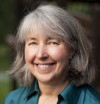
Prayer for the Homeless
Last week on Thanksgiving Day my family and I spent a few hours roaming the streets of Los Angeles, handing out care packages to the homeless. We encountered many tragic individuals – people with mental illnesses, chronic physical disabilities and addictions, and some who for one reason or another were just down on their luck – all struggling to survive on the streets.
At the end of the day we felt more grateful than ever for all of the blessings that have been showered upon us during our lives. Were it not for mysterious grace, we ourselves could be among those in harm’s way on the city streets.
This week I learned that Pope Francis has perhaps been sneaking out of the Vatican at night, in humble disguise, to minister to the poor and homeless on the streets of his city. My heart soars to think that perhaps there is a new dawning awareness that we are all one – we are all connected.
And when one of us suffers, we all suffer.
There is boundless need for our compassion and generosity in this world – and, thankfully, it turns out that our capacity for giving is boundless, as well. We simply have to open our eyes, don a humble disguise, and be present to the pain and suffering of our brethren. I offer a prayer for those who dwell in vulnerable situations this day.
Prayer for the Homeless
O Creator of shelter and storm,
we gather under
shingled roofs and marbled domes,
sacred canopies and vaulted rafters,
to ask that your
infinite and invisible hand
cover and protect
all those who slumber
under troubled skies,
without the comfort of
familiar walls and well-worn floors
to surround and hold
their cares.
May those who have lost
their homes and hearths –
whether through flood or fire,
frailty or foreclosure –
find hope in the stars
that blanket their misfortune,
comfort in our prayers
that swathe their suffering,
and safety in the connectedness
that weaves their hearts
together with all other life.
Until we all find our
true abode
in the Universe,
bless those who sleep
without a home
this night.
Dr. Karen Wyatt is “America’s Spiritual MD” who writes about spirituality and health and coping with life’s difficulties. Read more about her work at karenwyattmd.com and contact her at karen@karenwyattmd.com.
What To Do When Things Fall Apart
Life is tough, there’s no question about that. Sooner or later nearly everyone finds a time when nothing seems to make sense any more, life is going nowhere and there’s no clear path to follow. Maybe you hate your job or the relationship you’re in or you are just tired of it all, but you don’t know what to do.
These dark times in life are actually opportunities – fertile ground for growth and change. But you need to have a game plan in order to make the most of the situation. If you spend too much time feeling hopeless and trapped you might end up getting sick or having an accident. When you refuse to change, life has its own way of forcing you to grow.
Here’s a simple little plan of attack for those times when you feel stuck and need to get moving. Focus your attention on these things to help get yourself back in a more creative mode and figure out what changes you need to make:
- Get a journal and start writing in it every day if possible. You need to get your thoughts organized and have a place to ventilate your emotions.
- Spend some time in quiet meditation and contemplation every day about what’s going on in your life so you can begin to make sense of things.
- Give up your anger at other people and especially at yourself. Anger is just a waste of energy and time and you can’t afford to squander either one. Recognize that anger is a state of mind that can be changed instantly. As soon as you become aware of it, choose to let it go.
- Accept that life doesn’t follow your plans – it has its own path and timing and is a mystery much of the time. Give up trying to control your situation to make it turn out the way you want.
- Be grateful for everything. Your life could be so much worse than it is right now. Look for the good things in all aspects of your life and spend a little time every day reminding yourself of them. If you can’t see anything good in your life then you need to go visit a homeless shelter or a long-term care facility and spend some time with people who have nothing – not even their health.
- Live all aspects of your life with integrity. Take a look at how you spend your free time and decide if your activities reflect the highest part of yourself. Be honest about it and make changes if necessary.
- Live within your means. If you have to give up something now remember that it is only temporary – when your situation changes you may be able to expand your lifestyle again. This is hard but it is important to demonstrate that you can be responsible for the resources you have and live with discipline.
Remember the old saying “This too shall pass,” meaning that everything, both bad and good, eventually comes to an end. Someday this difficult time will become just a memory. Hopefully you will have made the most of this opportunity and learned some valuable lessons from it that will help you in the future. That’s how we grow: one failure and one recovery at a time.
If you would like to learn more about growing spiritually through the difficult times of life, check out The 7 Lessons Wisdom Path. This workshop will show you how to navigate life’s challenges and find joy in the process. Learn more here.
Dr. Karen Wyatt is “America’s Spiritual MD” who writes about spirituality and health and coping with life’s difficulties. Read more about her work at karenwyattmd.com and contact her at karen@karenwyattmd.com.


